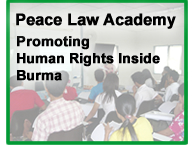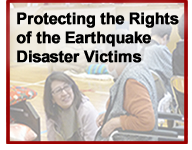On July 2013, HRN issued a statement protesting Against Remarks of the Government, "Definition of Aggression is unsettled."
Protest Against Remarks of the Government, "Definition of Aggression is unsettled."
Immediate Release
2013.7.5
Human Rights Now
1 Recent Remarks Concerning Definition of Aggression
During the Upper House Budget Committee session for the House of Councilors on 22nd April 2013, Prime Minister Shinzo Abe recently stated "It is not succeeding the contents of discourse as an Abe cabinet." referring to discourse between the Prime Minister and previous Prime Minister Tomiichi Murayama, who made an apology for aggressive war. Moreover, the following day, on 23th April, Mr. Abe stated that the "Definition of Aggression is unsettled in the academic community and international society. It depends on a countries relationship to see this.", concerning colonization and invasion in the same Committee. Mr. Abe met with strong opposition both inside and outside of the Government following the comments, and on 15th May, he modified his statement about Mr. Murayama, adding that "I never said that there was no aggression".
However, when Mr. Abe later answered inquiries from the Diet on 24th May, he stated that the "Definition of Aggression under International Law is discussed over and over again but is not established with a proper definition yet and it is impossible to answer your inquiry."," the Definition of Aggression under International Law is still being discussed and it is uncertain that there is an established definition." and "it is impossible to judge if it is an 'International Agreement' according to United Nations General Assembly Resolution 3314 on the Definition of Aggression and Amendments on the crime of aggression to the Rome Statute of the International Criminal Court ". The Ministry of Foreign Affairs follows this notion.
This series of remarks is against International Law and defies an important international consensus which has been achieved by many countries including Japan. Human Rights Now, an international NGO, based in Tokyo protests these remarks.
2 United Nations General Assembly Resolution 3314
In 1974, a "Resolution on Definition of Aggression" was adopted with the agreement of the Japanese Government at the United Nations 29th General Assembly (Resolution 3314(XXIX)). In the resolution, it is defined that " Aggression is the use of armed force by a State against the sovereignty, territorial integrity or political independence of another State, or in any other manner inconsistent with the Charter of the United Nations, as set out in this Definition" in Article 1, and "Any of the following acts, regardless of a declaration of war, shall, subject to and in accordance with the provisions of article 2, qualify as an act of aggression" in Article 3 and it enumerates concrete acts below.
(a) The invasion or attack by the armed forces of a State of the territory of another State, or any military occupation, however temporary, resulting from such invasion or attack, or any annexation by the use of force of the territory of another State or part thereof,
(b) Bombardment by the armed forces of a State against the territory of another State or the use of any weapons by a State against the territory of another State;
(c) The blockade of the ports or coasts of a State by the armed forces of another State;
(d) An attack by the armed forces of a State on the land, sea or air forces, or marine and air fleets of another State;
(e) The use of armed forces of one State which are within the territory of another State with the agreement of the receiving State, in contravention of the conditions provided for in the agreement or any extension of their presence in such territory beyond the termination of the agreement;
(f) The action of a State in allowing its territory, which it has placed at the disposal of another State, to be used by that other State for perpetrating an act of aggression against a third State;
(g) The sending by or on behalf of a State of armed bands, groups, irregulars or mercenaries, which carry out acts of armed force against another State of such gravity as to amount to the acts listed above, or its substantial involvement therein.
The Japanese Government which agreed to this resolution cannot overlook it by insisting there has never been an agreed international definition of aggression. This is not in accord with the obligations assumed by them in accordance with the present Charter ( Charter of the United Nations Article 2 2). The comments made by Prime Minister Abe to the Diet rejected the UN Resolution, an 'International Agreement' which Japan agreed to.
3 Rome Statute of the International Criminal Court Review Conference
In 2010, a Review Conference of the "Rome Statute" of the International Criminal Court reaffirmed the Definition of Aggression, on the assumption that the International Criminal Court has jurisdiction over crimes of aggression.
Rome Statute Article 8.1 states that" for the purpose of this Statute, a "crime of aggression" means the planning, preparation, initiation or execution, by a person in a position effectively to exercise control over or to direct the political or military action of a State, of an act of aggression which, by its character, gravity and scale, constitutes a manifest violation of the Charter of the United Nations." And Article8.2 provide that" Any of the following acts, regardless of a declaration of war, shall, in accordance with United Nations General Assembly resolution 3314 (XXIX) of 14 December 1974, qualify as an act of aggression" and enumerate the same definitions of Resolution 3314 Article3(a) through (g). Rome Statute Article 8.2 is significant because it is different from Resolution 3314 in that it does not mention the Security Council and does not entrust the Security Council to authorize a definition of aggression.
Japan participated in this Conference and played a positive role ,"(イ) After World War Ⅱ, aggressive crimes have been discussed along with their historical significance.(ロ) The amendment to the Statute adopted at this time, with the understanding that certain conditions be satisfied in the future, will be considered an admission that the ICC can exercise jurisdiction without authority of the Security Council. Until now, permanent members of the Security Council have the prior authority to admit in the Security Council, this could be revolutionary content of agreement. The answer that Mr. Abe did look down on the contents of agreement which has been adopted in the Review Conference of the Rome Statute of International Criminal Court with Japanese participation.
4 An Antiwar Pact
Before World War Ⅱ, the Treaty for the Renunciation of War (the so-called 'an Antiwar Pact' or 'Kellogg-Briand Pact') concluded in 1928, The High Contracting Parties solemnly declare in the names of their respective peoples that they condemn recourse to war for the solution of international controversies, and renounce it, as an instrument of national policy in their relations with one another (Article 1).On the conclusion of this Treaty, it supposed that a State can exercise self-defenses to take action to start war, however "War which is measures of states' strategy" except self-defense became illegitimate. This Treaty took effect in 1929, almost all countries including Japan accepted it. Japan ratified an Antiwar Treaty in 1929, the Manchurian Incident occurred in 1931, Japan insisted the Manchurian "Incident" did not begin with a declaration of "war", this was considered an act of self-defense to protect the Japanese authorities and avoid violating the Antiwar Treaty. However, at that time, no country supported the Japanese position among the League of Nation, the League adopted the resolution of Japanese withdrawal from Manchu by a majority of 42 to 1, abstention. This resolution was based on the report of the Lytton commission that the Manchurian Incident was not an act of self-defense.
If the intention of Mr. Abe's remarks supposed International Law before the War, Japanese armed intervention after the "the Manchurian Incident" was clearly illegitimate use of force, in other words, it was deemed as Aggressive War under International Law. This is an unchangeable fact.
5. Mr. Abe suggested there is no definition of Aggression and so the Ministry of Foreign Affairs have also neglected and denied basic principles of International Law which international society has been building for many years. Reflecting on WWⅡ this does not respect the spirits of the UN Charter which provide that the use of force is illegal. To take this position openly, endangers the international order and continuing peace.
Human Rights Now requires that the Japanese Government learn the agreement achieved by international society and accepts the definition of aggression defined in the international agreement, respects it and drastically modifies the governments view.
1 http://www.kiyomi.gr.jp/activity/kokkai/inquiry/a/20130605-954.html
2 The Ministry of Foreign Affairs stated in the answer of the interview of press attaché Mr. Yokoi, foreign affairs officer, " There are no addition to the Prime Minister's' remarks as The Ministry of Foreign Affairs. Basically, Definition of Aggression is still discussed over and over again but it is not established properly government definition finally.
3 http://www.icc-cpi.int/NR/rdonlyres/ADD16852-AEE9-4757-ABE7-9CDC7CF02886/283503/RomeStatutEng1.pdf
4 http://www.mofa.go.jp/mofaj/gaiko/icc/rome_kitei1006.html
5 Consequentially, Japan seceded the League and went to the WWⅡ.







